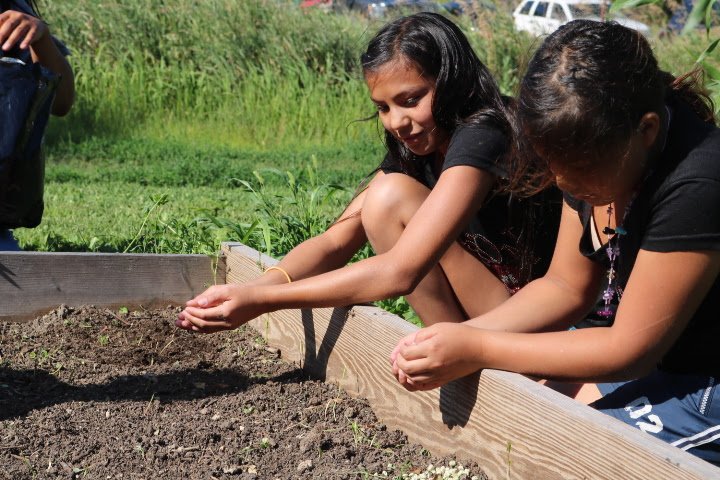Siċaŋġu Food Sovereignty Initiative Introduces“The Adult Food Leaders Program”
Sicangu Lakota youth community members prepping their gardens
At Siċaŋġu Co, we are excited to share the latest developments within our Sicangu Food Sovereignty Initiative - introducing the Adult Food Leaders Program! The Adult Food Leaders Program will support ten established small-scale food producers in our community such as individuals who garden, forage, raise livestock, provide seeds or starter plants.
The program is designed to empower local producers by providing financial support of $1,000 to up to ten established producers committed to gardening, seed keeping, livestock, beekeeping, foraging, and growing traditional foods. This flexible funding allows producers to address specific needs outlined in the plans that they create in order to apply for the program.
Sicangu Lakota community members tilling their gardens
Mayce Low Dog, FSI Community Engagement Coordinator who is leading the program, shares, “our primary goal is to enhance local producers' access to agriculture resources, contributing to the sustainability of the Sicangu Lakota community. The program also serves as a crucial data collection tool.” Mayce elaborated on the fact that the community and surrounding programs in the area have very little data around specific needs in this category. “Producers in the area are on their own, but doing the best they can to learn how to sustain their practices. Understanding the immediate and long-term needs of producers, will teach us how to better support our community members in this category.” This will be a stepping stone for the Siċaŋġu Food Sovereignty Initiative to identify and address local producers' needs, whether it be supplies, education, funding, or land.
Sicangu Lakota community members foraging traditional medicines in the Great Plains grasslands
The Food Sovereignty Initiative team envisions building stronger community connections around agriculture. The project aims to build support among producers in the area, promote healthy eating while utilizing local produce, facilitate convenience in goods exchange, and most importantly, serve as a stepping stone to the sovereign economy for the Sicangu Lakota Oyate.
It has been reassuring to know that there is an immediate need for established producers in the area because within just one day of announcing the program, the Food Sovereignty Initiative has already received six thorough applications, this obviously emphasizes the urgent need for support. The selection process prioritizes tribal members, considers location, long-term commitment, and demonstrated need.
Sicangu Lakota community member holding locally produced eggs
Once the selection process is complete, participants will meet with Mayce to provide updates by the end of May 2024 through phone or email, and in-person check-ins are required for July and September 2024. These check-ins are necessary to ensure accountability, success of the program, and ongoing support between both the producer and program management. Another offer of support within the program is a unique collaboration with Tatanka Funds, our sister CDFI which will be available for these ten producers to take on financial literacy classes and business planning to empower them with essential skills needed for sustainable success.
Participants will also have the chance to sell their produce at the seasonal Siċaŋġu Co Farmers Market or even sell directly to Siċaŋġu Co, allowing us to give back to the community through donations of the produce. To maintain transparency, a donation tracking form will be implemented and maintained by the Food Sovereignty Initiative team.
We are looking forward to the potential impact of the Adult Food Leaders Program and sincerely appreciate your continued support. Stay tuned for updates on the program. Together, we're building supportive communities and sustainability for the Sicangu Lakota Oyate.
Please continue to support our work or join us in creating a better world for future generations.
Wopila!





